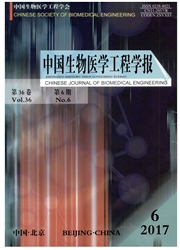

 中文摘要:
中文摘要:
目的是研究不同生物材料对血管内皮细胞中细胞因子表达水平的影响,探讨与血栓形成有关的细胞因子mRNA表达变化与生物材料血液相容性之间的关联性。实验选择8%有机锡的聚氯乙烯为阳性对照,细胞培养用的聚苯乙烯为阴性对照,聚四氟乙烯、膨体聚四氟乙烯以及两种医用聚氨酯(PU-50和PU-60)作为实验材料,采用人脐静脉内皮细胞株ECV-304,通过细胞与不同材料的接触,运用逆转录聚合酶链反应(RT-PCR)方法,测定内皮细胞中与凝血功能密切相关的两种重要的细胞因子:白介素-8(IL-8)和肿瘤坏死因子-α(TNF-α)的mRNA表达水平。结果显示:与阴性材料相接触的内皮细胞其IL-8和TNF-α的表达均呈阴性,与阳性材料接触的细胞因子表达均呈强阳性,两种聚氨酯材料尽管在细胞生长、附着和形态变化等方面经肉眼观察未见明显差异,但是两者在细胞因子的表达上却出现显著的不同,其中PU-60组表达水平明显高于PU-50组;聚四氟乙烯和膨体聚四氟乙烯材料表现出程度不等的表达增强,前者比后者更明显。将IL-8和TNF-α在上述6种材料中的表达情况进行秩相关分析,得到相关系数为r=0.88571(P〈0.05)。由此提示:血管内皮细胞对不同生物材料刺激所产生的反应在细胞水平和分子水平上可出现不完全一致的现象,后者显然较前者更为灵敏,通过检测血管内皮细胞中IL-8和TNF-α的mRNA表达改变,在一定程度上可推测生物材料血液相容性的优劣。
 英文摘要:
英文摘要:
This study was to evaluate the effects of different biomaterials on cytokine of human umbilical vein endothelial cells (ECV-304) and to investigate the relationship between the mRNA expressions of cytokine related to thrombosis forming and hemocompatibility, Six kinds of biomaterials including PVC coating with 8% organic tin (positive control), polystyrene (negative control), polyurethane (PU50 & PU60), PTFE and ePTFE were exposed to ECV-304 cells for 24h. The expression of mRNAs specific for cytokine interleukin-8 (IL-8) and tumor necrosis factor -alpha (TNF-α) were tested in vitro by RT-PCR with specific primers. The results demonstrated that different sorts of biomaterials could induce the expression of cytokine with different degrees. The polystyrene showed the negative result, and PVC with organic tin showed strong mRNA expression for both cytokines. PU-60 appeared stronger mRNA expression of two cytokines than that of PU50. There was almost no significant differences of TNF-α expression between polystyrene and PU-50.The PTFE and ePTFE, which were considered to have good hemocompatibility, however showed ability to induce the expression of two cytokines in ECV-304 cells with different degrees. The correlative coefficient between expression of cytokine IL-8 and TNF-α was 0.88571 ( P 〈 0.05). Therefore it seems that the cellular reaction to biomaterials at molecular biological level may be different from that at cell biological level. The former is more sensitive than the latter. The hemocompatibility of biomaterials might be predicted to some extent by ways of detecting the varied mRNA expressions of cytokine IL-8 and TNF-α.
 同期刊论文项目
同期刊论文项目
 同项目期刊论文
同项目期刊论文
 期刊信息
期刊信息
